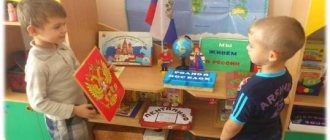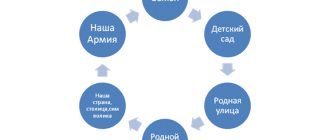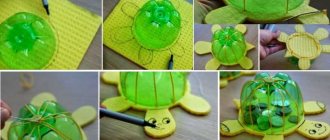Long-term work plan for patriotic education of children in the secondary group
A long-term work plan for the patriotic education of children in the secondary group.
Educator: Bikmukhametova Fanuza Minullovna.
Target
patriotic education of preschool children - to instill love for the Fatherland and pride in its culture.
Tasks:
1. Formation of a civic-patriotic attitude and a sense of belonging:
- to family, village, country;
- to the nature of the native land;
- to the cultural heritage of their people.
2. Instilling self-esteem in a child as a representative of his people.
3. Fostering a tolerant attitude towards representatives of other nationalities.
4. Fostering patriotism and a sense of pride in one’s country.
| Month | Subject | Program content | Work with children | Working with parents | Literature |
| September | "My family" | Encourage students to write a short story about their family. Form a generalizing word - my family. Know and call all family members by name, mother and father by name and patronymic. | — Reading D. Gabe’s story “My Family.” — Didactic game “Little Helpers.” — Drawing “My House”. | Design of the photo album “Our Friendly Family”. | — Vostrukhina T.N., p. 50. — Kondrykinskaya L.A., p. 13. |
| October | "Our village" "Home address" | Instill love for the Native village and respect for its inhabitants. Expand your understanding of your immediate environment and strengthen your skills for safe behavior on the street. Teach children to solve problem situations and remember their home address. To form in children the moral qualities of kindness, attention to friends and adults. | — A targeted walk along the nearby streets of the village. — viewing the photo album “My Village.” — Reading poems about the Motherland. — Drawing “Beautiful houses.” — Game “The postman brought a parcel.” - Game “Guess who came?” | Take pictures of your street and house to create the album “Streets and Houses of Our Village.” Assignment: take a tour of your street. Show me a hundred interesting and beautiful things to eat on the street. Introduce yourself to the sights of the village. | — Vostrukhina T.N., p.87. |
| November | "Nature of the Native Land" "Our good deeds" | Expand children's understanding of their native nature. To form moral qualities: care, attention, kindness, responsiveness to other people. | — Reading poems about nature, about birch. — Listening to the Russian folk song “There was a birch tree in the field”, “Oh, you birch tree.” — Drawing “Let's look out the window.” — Didactic game “Name it affectionately.” — Reading A. Vvedensky “Who?” | Learn a poem about your native nature with your child. | — Grishchenko Z.A., page 29. — Lykova I.A., lesson 18. |
| December | “My parents can and do” (professions) "New Year is approaching" | Generate interest in various professions. Foster interest and respect for the work of adults (parents). Create a festive mood, cultivate a love for Russian folk traditional holidays. | — Conversation with children “Professions of our parents.” — Reading fairy tales, poems about winter, about the New Year. — Listening to fairy tales and songs (CD). | Design of the exhibition of creative works of parents “My Family’s Passion”. Participation in the competition of the preschool educational institution “Santa Claus’s Mittens.” |
Project “Formation of patriotic feelings among older preschoolers”
Target:
Continue to introduce children to folk traditions and customs. Expand ideas about the art, traditions and customs of the peoples of Russia. Expand ideas about the diversity of folk art and crafts (different types of materials, different regions of our country). Cultivate interest in the art of your native land; love and respect for works of art.
Continue to introduce children to oral folk art. Use folklore when organizing all types of children's activities.
"Our Cosmonauts"
Target:
Introduce children to the history of the development of astronautics, to the first cosmonauts.
Form an initial idea of the structure of the solar system, the planets (their sizes, location to the Sun, some features).
"Victory Day"
Target:
Raise children in the spirit of patriotism and love for the Motherland. Expand knowledge about the heroes of the Great Patriotic War, about the victory of our country in the war.
Introduce monuments to WWII heroes.
Tell children about the military awards of their grandparents and parents.
Talk about the continuity of generations of defenders of the Motherland: from epic heroes to heroes of the Second World War.
Develop a respectful, caring attitude towards elderly relatives.
The project is carried out through the following forms
work with children: direct educational activities, entertainment, holidays, conversations, reading fiction and familiarization with oral folk art, artistic creativity, role-playing, folk, verbal, didactic games, listening to musical works.
Working with teachers
for patriotic education of children is organized in the following forms:
•Consultations on “Patriotic education of preschool children.” “The role of the family in the moral and patriotic education of preschool children.” “Russian cultural traditions and moral and patriotic education of preschoolers.” “Creating conditions in kindergarten for the patriotic education of children.”
•Show-competition of corners on patriotic education of children.
•Implementation of pedagogical projects “Folk rag doll”. “Matryoshka is the soul of Russia”, “Museum in a preschool educational institution”, “The city in which I live”, “My native land”, “Secrets of space”.
•Master class for teachers “Rag Doll”.
•Pedagogical Council “Moral and Patriotic Education of Preschool Children.”
Thematic planning for working with parents
.
forms are used to work with parents:
works: consultations: “Moral and patriotic education of preschool children”, “Education of citizenship and patriotism in preschool children through music”, “Russian folklore in educating preschoolers about the culture of family traditions”, “Education of children through familiarization with folk culture”; parent meeting “Raising Patriots”; master classes: “Folk traditions in the life of your family”, “Folk and applied creativity. Types of patterns of Russian folk art crafts in drawing"; survey; production of booklets: “Rites and customs of Russian folk culture. Naming”, “Play folk outdoor games with children”, “Holding the Defender of the Fatherland Day holiday at home”. As well as such forms of work as round tables, conversations, joint exhibitions of drawings and photographs with children, and involving parents in participating in entertainment and celebrations.


